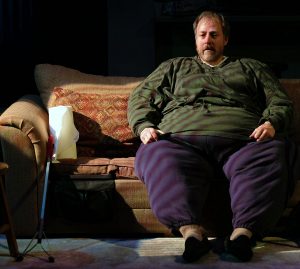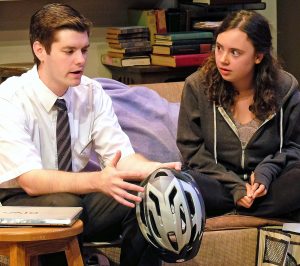Uneven Subtext Can’t Sink Cygnet’s Good ‘The Whale’
Charlie’s lonely sojourn from his bathroom to his living-room sofa – a distance of 18 feet at the outside – is about the equivalent of a novice climber’s trek up Mt. Everest. The walking death wish, who at 600 pounds has eaten himself into the otherworld amid the passing of his boyfriend, huffs and puffs and clanks between the locales, a hapless aluminum walker the only thing between him and a perhaps terminal face-plant.
There are lots of understories in Cygnet Theatre Company’s current The Whale, Samuel D. Hunter’s study of Charlie and how he got the way he is, and they’re all fairly well-written – but they diverge when Hunter waxes a little too metaphorical for the plot’s tastes. Imagery is fine, obviously, but it needs to impose its own absolutes lest it violate its genre’s constraints.

The bulk-infested Charlie (Andrew Oswald) is very lonely, in many more ways than one. Photos by Ken Jacques
Charlie’s gayness and his devotion to departed Adam come on the heels of a hetero marriage that yielded a stormy divorce and a troubled teen daughter. And his vomit-beige apartment is hardly a reflection of his lofty intellect (he holds a master’s degree in English from the University of Idaho and probably scored it amid lots of honors). And he critiques U of I kids’ essays for a living, but he does it over the Internet, thus ensuring his relative facelessness.
And he’s got only one true friend. And he refuses to go to the hospital for lack of insurance. And a misguided Mormon elder has decided to camp out at his place.
And that damn bathroom is still an Everest away.
And he’s dying.
… why does Hunter illustrate Charlie’s affinities for the story only at the peaks of his crises… ?
At the last instant, we’re led to believe Charlie has effected repairs (sort of) to his relationship with maverick daughter Ellie, who’s hellbent on finding the bad in everything and everyone (and who’s also blessed with some of the best lines in the show). In fact, Ellie’s eighth-grade apologia about Herman Melville’s Moby-Dick (Charlie says her paper is the best of its kind he’s ever read) suddenly becomes central to Hunter’s more ingratiating images. The nods to the classic sea tale and to the Bible’s Jonah color the story’s development with classical forms and shapes that ring a little gimmicky.
If Charlie’s such an expert on Captain Ahab and all those guys, then why does Hunter illustrate Charlie’s affinities for the story only at the peaks of his crises, and only for our purposes? Uneven, to say the least.
But what’s done is done – now it’s the cast’s turn, and Hunter and director Shana Wride give everybody plenty of good stage and face time. Andrew Oswald’s tragic Charlie is the picture of enigma – Charlie is exceptionally covetous of his intellectual prowess, and Oswald illustrates this trait amply and accordingly. Nurse Liz is both Charlie’s unwitting sidekick and his armchair devotee, and Judy Bauerlein impressively straddles both angles. She has a couple intense scenes with Craig Jorczak’s disenfranchised Elder Thomas, alleging that the Mormons are accessories in Adam’s death – and while Thomas fields the criticism well, Hunter has introduced the character maybe a little too early in the play’s development.

Elder Thomas (Craig Jorczak) seeks counsel from Ellie (Erin McIntosh) as the blind lead the blind.
I have no quarrel with the technical effort here, except as R. Craig Wolf’s lights and Melanie Chen’s sound affect the play’s progress. These two elements are chiefly apparent when Charlie invokes shades of Melville and biblical lore, which is to say they fuel the show’s biggest demerits.
Given Charlie’s enormous bulk, all the show’s cetacean imagery is not only appropriate; it’s almost unavoidable. Hunter has maybe taken it to an extreme in his attempt to reach the character’s paper-thin core, but he’s also surrounded his central figure with the type of people you’d expect. The Whale is a pretty gosh-darn good piece of theater. A little less metaphor around the edges, and it would have been a great one.
This review is based on the matinee production of May 24. The Whale runs through June 14 at The Old Town Theatre, 4040 Twiggs St. in, oddly enough, Old Town. $32-$54. (619) 337-1525, cygnettheatre.com.

Martin Jones Westlin, principal at editorial consultancy Words Are Not Enough and La Jolla Village News editor emeritus, has been a theater critic and editor/writer for 25 of his 47 years…
More…


